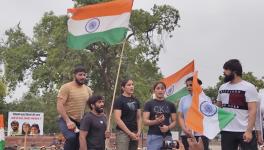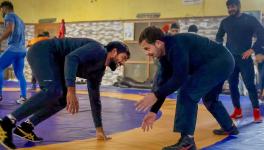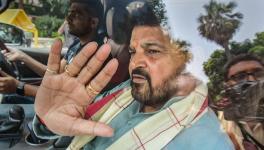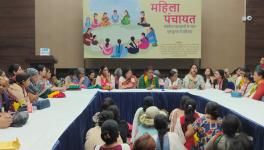Metal Over Mettle: Indian Wrestling Story From Asian Championships
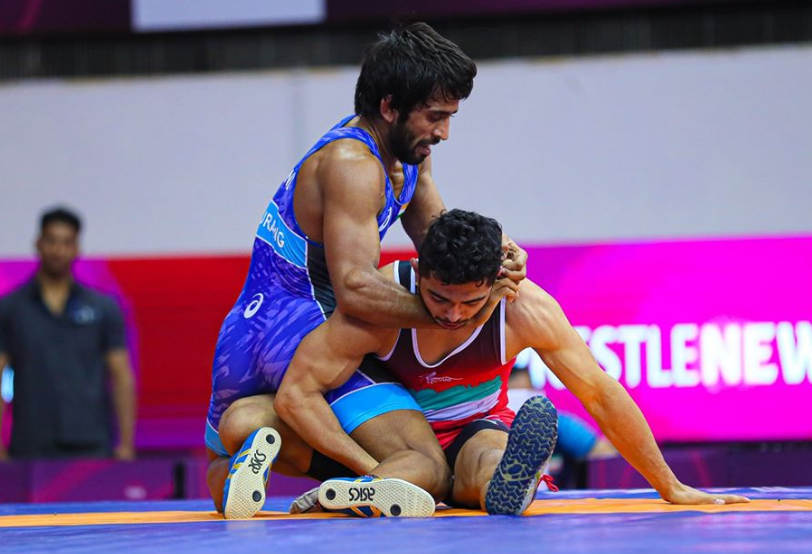
Despite winning silver, Bajrang Punia’s loss to his arch nemesis, Japan’s Takuto Otoguro 10-2, in the final of the 65 kg category poses doubts about his ability to sort out his weak links before the Tokyo Games (Pics: UWW).
The PA system sputtered to life with a call for the medal bouts of the super heavyweight category at the Asian Wrestling Championships. A pleasant Sunday afternoon had slowly turned to a mildly chilly evening as the championships entered the last set of bouts. The 125kg freestyle division did not have any Indian in contention for a medal and, understandably, the proceedings hardly whipped up excitement or attention. Heavyweight wrestlers have rarely performed well for India at the continental level and above and so the lack of Indians in the fray never created a debate among the Indian thinktank, who were busy celebrating a rich haul from the competition — the country's best ever at the Asian level.
By the time the second bronze medal match of the segment began, the sparse crowd at the stands of the KD Jadhav wrestling hall in New Delhi had already trickled out. The lack of buzz on a day when an Indian fought for gold and others, including world championship silver medallist Deepak Punia were in the reckoning, was quite telling. One had seen better days at the country's premier wrestling stadium, so used to the roar of full capacity crowd a few years back, when stars of what has now become the previous generation of Indian wrestling ruled the mats. The national trials late last year, in fact, had more spectators and buzz. The competition, arguably, was much more heated too.
The lack of feel is intriguing as well since the sheer volume of medals won — India grabbed a total of 20 across the freestyle, Greco-Roman and women's divisions, and finished third overall behind table-toppers Japan and Iran — should be enough to inspire awe. They were second in the freestyle segment behind Iran, and ‘historic victory’ was the keyword played on loop at the venue, repeated at the drop of a hat by the Wrestling Federation of India (WFI) officials.
All this despite knowing all too well the truth — the quality on display at the championships was a pale shade of the real worth of Asian wrestling. China and North Korea gave Delhi a miss because of the Coronavirus crisis, while, barring a few divisions, top teams including Japan and Iran, sent junior wrestlers to compete. India went into competition full strength — opting for the emotional call of putting up a great show at home, rather than the logical course of letting the big guns rest for competitions which actually matter in an Olympic year.
Also Read | Story of Indian wrestling’s Greco-Roman Stepson
The fans who made it to the venue on the last day perhaps wanted to gloss over this disappointment. A selfie would help. Bajrang Punia, the World No. 2, who lost in the final the previous day, was at the training hall adjacent to the main venue. Some fans decided to hang around next to the large glass panes of the hall, trying to get Bajrang's attention. One or two of them were even trying to convince the private security guard on duty at the side entrance to the hall to allow them in. “Bhai hei mera, woh jaante hei mujhe (he is my brother, he knows me),” came the plea, turned down firmly by the uniformed personnel.
It turned out the fellow was indeed known to Bajrang, who, after stepping out, stopped for a hug and a selfie with the “bhai”. Many selfies followed, Bajrang obliging each request with a smile and exchange of pleasantries in Hindi and Haryanvi, even as his two-SUV motorcade waited. He seemed to have come to grips with the loss the previous night, against his World Championships nemesis from two years back, Takuto Otoguro of Japan.
There is no doubt that losing to a former world champion doesn't belittle Bajrang's achievements nor does it bring down his worth as a grappler of global reckoning. However, when the two met at the Worlds final in 2018, Bajrang lost gold in a hotly contested bout. He was always in the hunt during the tussle. The 10-2 scoreline in their bout in Delhi should ring alarm bells for Bajrang’s corner. Beyond the scoreline, it's the way he lost the match-up that makes one wonder whether things are unravelling for India's big medal hope in Tokyo.
Bajrang seemed a bit at sea against Otoguro. It was evident that the Asian Games champion had worked on his weak and much-criticised leg defence. The tweaks made seemed to have constricted his naturally attacking demeanour. And when facing a versatile wrestler like Otoguro, his confusion was magnified. Otoguro is an intriguing wrestler himself. A year after the World Championships gold, he failed to make it to the Japanese squad for the 2019 edition, losing in the national trials. The loss is proof that he, despite being a wonder grappler, is not invincible. Having said that, his style revolves around leg takedowns which use angles that require less power and involve more manipulation of physics at the joints. Twice he ankle-tapped and twisted around to take down Bajrang. And the Indian, who could have countered easily had it been a straightforward brute-force or momentum-driven takedown, had no choice but to concede the point or risk getting injured.
Bajrang's underwhelming (by his own lofty standards) Asian outing seems to have left him in a tricky corner. One can just hope he has not lost confidence with the bad loss. There is a chance this would help him sort out his fighting style transformation. He looked more work in progress now than he has ever been after bursting into the senior scheme of things with a bronze in the 2013 World Championships.
Also Read | The Australian Hockey Secret
Though Emzarios Shako Bentinidis, Bajrang's personal coach, understands the dynamic of nurturing an elite wrestler, he, perhaps is constrained by the Indian wrestling federation's hierarchical ways. A few months ago, there was the drama involving the wrestler, coach and the federation, with a new coach arriving at the WFI office in New Delhi and news doing the rounds that Shako has been sacked by Bajrang. The new coach went back and Bajrang and Shako cleared the “rumours”. Hardly the kind of preparation one would want for an athlete in the final stages of his mission for Olympic gold.
The WFI has been consistent, though. For its part, the federation has shown once again that it has no idea how to nurture world-beating wrestlers. While the likes of Russia, US, Japan and Iran are shielding their Olympic contenders, Bajrang is getting exposed, his chinks left bare more than ever and his medal prospects looking compromised, though salvageable.
Bajrang's and India's predicament is a far cry from that of his nemesis from Japan. Otoguro has come up from the brilliant wrestling programme of the Yamanashi Gakuin University, under coach Yuji Takada, who is a four-time world champion and a gold medalist at the 1976 Montreal Olympics. One of Otoguro's juniors at the university, Shutaro Yamada, deflated Indian aspirations when he beat Deepak Punia in the semifinals of the 86kg category. After all, the 19-year-old Yamada has just begun his international wrestling career.
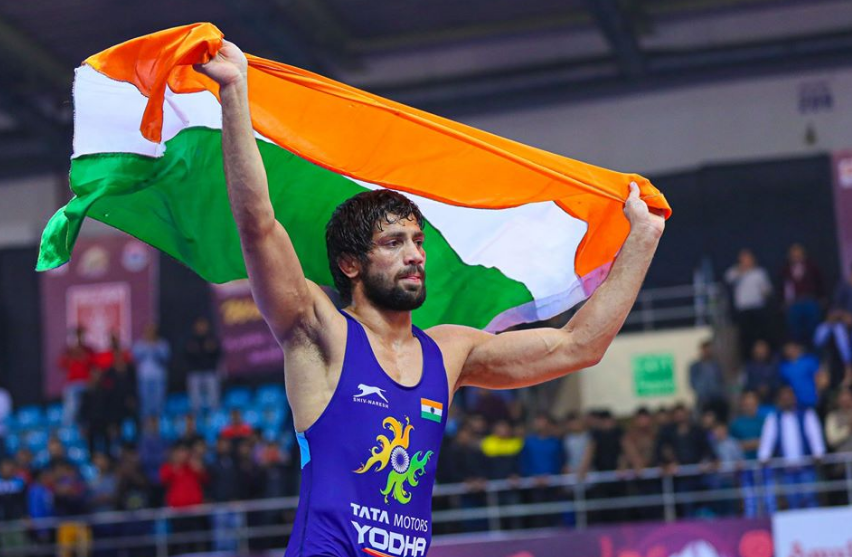
Ravi Kumar Dahiya, who won gold in the 57kg division at the Asian Wrestling Championships, has elevated himself as a medal contender for India at the Tokyo Olympics.â
“I took part in the Cadet World Championships as well as the junior worlds,” said Yamada on a walk back to the training hall after his final bout. The corridors of the stadium were devoid of selfie hunters. Devoid of any people, in fact, and the silence provided Yamada the time and space to dig up English words for the conversation.
Yamada revealed that he is relatively new to wrestling. He was a judoka and got into wrestling after a friend inspired him to change mats. He has competed in international age-group meets but never won a medal. “This is my first medal and I am pretty thrilled to be the Asian champion. But I am nowhere close to being a top wrestler in my country. I will go back now and train, focusing on competing as much as possible and maybe make it into the national side by the time the 2024 Olympic Games come.”
Yamada, the journeyman wrestler from Japan, was the one who beat someone who has been hailed as the next big thing in Indian wrestling. His bout against Deepak in the semis was devoid of technical brilliance or intensity. It was a defensive power struggle with Deepak, despite more experience and higher ranking, showing a lack of attacking ideas, and execution. Yamada explained the poor execution bit in the blunt way only someone who is not so articulate in English would. “Deepak has a lot of power. He is very strong. But very slow. I could see things coming, I could control,” he said. Succinctly put.
Also Read | Sole for a Soul: Nike’s Chokehold on World Athletics
Deepak did win bronze at the championships, rolling over his rather timid Iraqi opponent via technical superiority. He went straight up to the stands after the victory, to greet the WFI officials and other dignitaries present — an Indian wrestling tradition. It was evident the WFI also pins high hopes on Deepak. He is their poster boy after the silver at the World’s last year. But their poster boy lost to a junior debutant at a championship! Going solely by experience, he should have won easily. That pierces the bubble Indian wrestling has wrapped itself in doesn’t it?
The 20 medals won apart, the Asian championships was, in fact, a long list of underwhelming performances by Indians in all segments. The classic example of this is Jitender, India’s replacement for Sushil Kumar. He won silver but the game of attrition he played to reach the final, making hard weather against opponents who were equally straightjacketed in their approach, doesn't inspire any confidence that he would earn India an Olympic berth in the division. In his bouts, Jitender was scraping points from pushouts, playing the passivity game — a sin in elite modern wrestling.
For Jitender, reaching the final mattered. A medal at the Asian competition earned him a shot at Olympic qualification in the upcoming qualifier to be held in Bishkek, Kyrgyzstan. With Sushil looming still — and experts say the double Olympic medallist would easily beat Jitender if a trial is held — Jitender scraped for the medal. He, however, may not get away with the scraping game at the much-more hotly contested Olympic qualifiers.
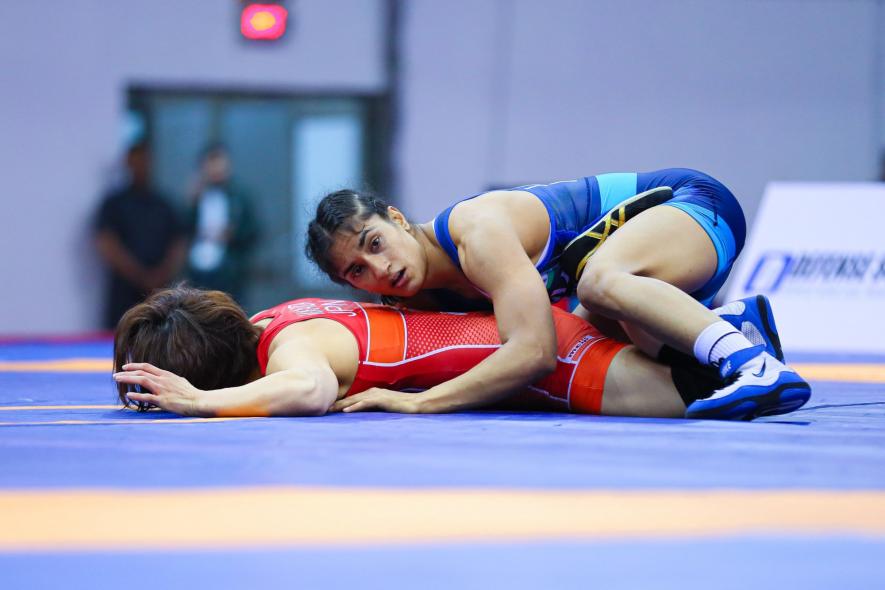
Vinesh Phogat settled for bronze in the 53kg category at the Asian Wrestling Championships, losing to Mayu Mukaida of Japan.
The fact that Sushil, despite his age, injuries and dip in performance, is still India’s best in the division, shows where we stand. And, this is not a statement praising Sushil’s quality. It serves us best to remember that the senior wrestler is way past his prime and finished outside of the medals at the 2018 Asian Games as well as the 2019 World Championships, losing rather tamely.
In the women's segment, Olympic medallist Sakshi Malik and Vinesh Phogat did manage to end up on the podium but more was expected from the stars. Of course, the stutters were sprinkled over by the five gold medals, won by sheer luck (as seen in the Greco-Roman win by Sunil Kumar) or paved by the lack of depth in the field (Pinki, Divya Kakran and Sarita).
Not all bad news though. While established and upcoming stars failed, one did feel the birth of a new flag bearer at the championships. A couple of other wrestlers returned credible performances (not gold), but the style of bouts, mat craft and temperament they displayed hold promise for the future. Rahul Aware, bronze medallist in the 61kg for instance, was set to enter the final. His lack of experience with reviews cost him points and the bout.
Also Read | SAI Kokrajhar: Tales From an Indian Sports Outpost
Come Tokyo, Ravi Kumar Dahiya, who won gold in the 57kg freestyle segment, could spring a surprise. Dahiya had won a bronze in last year’s World Championships, sealing the qualifying slot for India in the division. He followed that up with a brilliant performance at home. Dahiya’s bout inspires confidence on many counts.
To start with, his style has the right amount of technique-driven unpredictability that is a necessity in the lower weight categories. The way he was creating angles from close-quarter grappling — using his flexibility as well as technical guile in equal measure — to score points against all his opponents was a treat to watch. He won the gold in style too, beating Hikmatullo Vohidov of Tajikistan via technical superiority in the final. The 10-0 scoreline underlined his credentials — a cut above the field that was in the fray in New Delhi.
Dahiya’s journey up till the Olympics is important though, and hopefully, the WFI will find prudence in the way they plan it, including his competition schedule. More prudence will be needed with Bajrang though, the original Olympic contender for gold. And the reality check he received at the Asian Championships should act as a wakeup call. Unfortunately, Indian wrestling seems to be seeing things a tad differently. 20 medals, after all, is no mean feat. A case of metal beating mettle, indeed.
Get the latest reports & analysis with people's perspective on Protests, movements & deep analytical videos, discussions of the current affairs in your Telegram app. Subscribe to NewsClick's Telegram channel & get Real-Time updates on stories, as they get published on our website.










